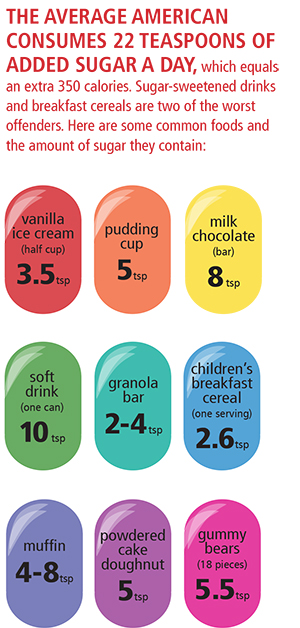Back Away from the Gummy Worms
 |
Children and teens ages 2 to 18 should consume less than 6 teaspoons of added sugars each day, according to new recommendations published in the American Heart Association journal Circulation.
Added sugars are any sugars, including table sugar, fructose, and honey, used in processing and preparing foods or beverages, added to foods at the table or eaten separately—not naturally occurring sugars in foods like fruit or milk.
Eating foods high in added sugars throughout childhood is linked to the development of risk factors for heart disease, such as an increased risk of obesity and elevated blood pressure.
"There has been a lack of clarity and consensus regarding how much added sugar is considered safe for children, so sugars remain a commonly added ingredient in foods and drinks, and overall consumption by children remains high—the typical American child consumes about triple the recommended amount of added sugars," says lead author Miriam Vos, nutrition scientist and associate professor of pediatrics at Emory.
Their recommendation of no more than 6 teaspoons of added sugars per day, "is a healthy and achievable target," says Vos.
Vos and Emory colleague Jean Welsh were part of a national panel of experts who did a comprehensive review of scientific research on the effect of added sugars on children’s health.
The major sources of added sugars in American diets are regular soft drinks, candy, cakes, cookies, pies, and fruit drinks; dairy desserts and milk products (ice cream, sweetened yogurt,) and other grains (sugar-laden cereals and breakfast foods, for instance).
Vos says children who eat foods loaded with added sugars tend to eat fewer healthy foods, such as fruits, vegetables, whole grains, and low-fat dairy products that are good for their heart health.
Other highlights of the AHA statement include:
- Added sugars should not be included in the diets of children under the age of 2, at all.
- Children and teens should limit their intake of sugar-sweetened drinks to no more than 8 ounces weekly.
- Overweight children who continue to consume more added sugars are more likely to be insulin resistant, a precursor to type 2 diabetes.
—Jennifer Johnson





